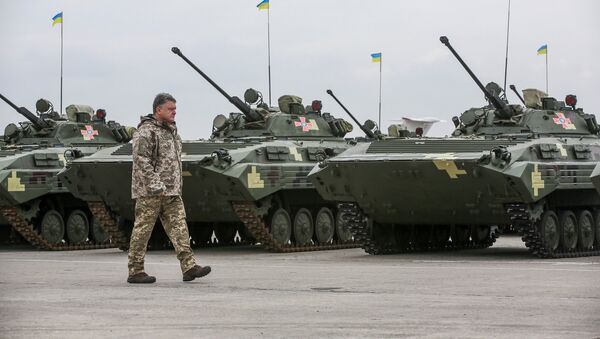In an interview for Ukrainian television on Sunday, Poroshenko called local opponents of the Minsk agreements to account, saying that the only two alternatives to the peace process would be trying to resolve the two-and-a-half-year old conflict 'by force', including a possible attack on Russia.
"Those who propose abolishing Minsk must propose an alternative," Poroshenko said, according to Ukraine's UNIAN news agency. "There are two alternatives: a military solution to the conflict, and an open attack on the Russian Federation. I ask to compare the military budgets and capabilities [of the two countries], and to take responsibility for future victims," the president added.
In April 2014, the Ukrainian military began an operation against pro-independence militia in the Donbass regions of Donetsk and Lugansk. In February 2015, the two sides reached a ceasefire deal following talks brokered by the leaders of Russia, France, Germany and Ukraine in the Belarusian capital of Minsk.
A shaky ceasefire has been in place ever since, with violations taking place almost daily. Kiev has been accused of refusing to adhere to the Minsk peace plan, with Ukrainian officials including President Poroshenko insisting that individual measures of the agreement can be fulfilled out of order. The leaders of the fledgling Donbass republics, meanwhile, have repeatedly indicated that the thirteen points of the agreement must be implemented in the order in which they are written.
Specifically, Kiev, first pushing to take control of the border between Russia and the Donbass breakaways, has called for an armed mission of the Organization for Security and Cooperation in Europe (OSCE) to do so before elections are held in the Donetsk and Lugansk People's Republics. But the Minsk text specifically states that control of the border is to be restored after elections, and makes no mention of the OSCE being granted responsibility for border control.
In other words, President Poroshenko has talked a good game about Kiev's commitment to Minsk at the same time that Kiev has worked to undermine the agreement by refusing to implement its elements in the proper sequence. Donbass officials are concerned that Kiev may be attempting to trick them into an agreement that results in their liquidation.
Commenting on Kiev's attempts to evade their responsibilities under Minsk, Commonwealth of Independent States Institute expert Denis Denisov told the online news website Svobodnaya Pressa that "without legally enshrined agreements on the political components of the Minsk agreements, there can be no talk about the border. This is possible only after the rights, freedoms and powers of citizens living in Donetsk and Lugansk People's Republics are constitutionally enshrined."
Meanwhile, the expert explained, the Ukrainian side "is trying by all possible means to haphazardly interpret the Minsk agreements that they themselves signed on to and agreed to fulfill; even though this is the only document on whose basis it is possible to stop the bloodshed and return life to normal."
Ultimately, Denisov suggested that Kiev "will continue to interpret the Minsk agreements in a way that is comfortable for them, thus departing from the letter and the spirit of the document. They will come up with new formats and language that are not acceptable to the Donbass republics. In this way, the long-awaited 'hour X', i.e. the full implementation of the agreements, can be delayed for a long time."
For his part, political scientist and former Odessa City Council lawmaker Igor Dimitriev warned that Kiev may simply stalling for time, and possibly waiting for support from overseas, or for an event that would cause everyone to forget about Minsk. Accordingly, he noted that Kiev would continue to resist implementing the agreements so long as it is not forced to do so.




